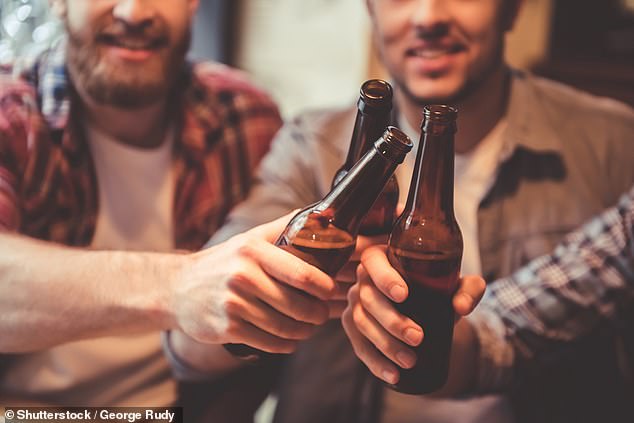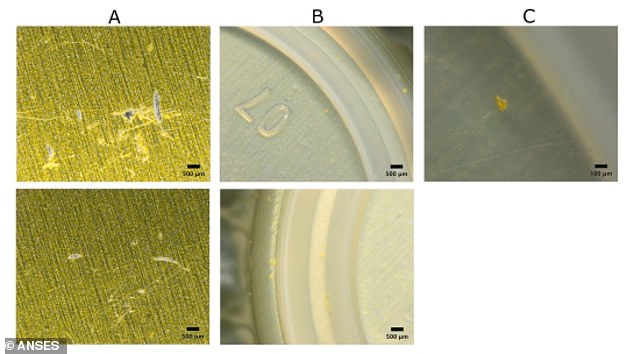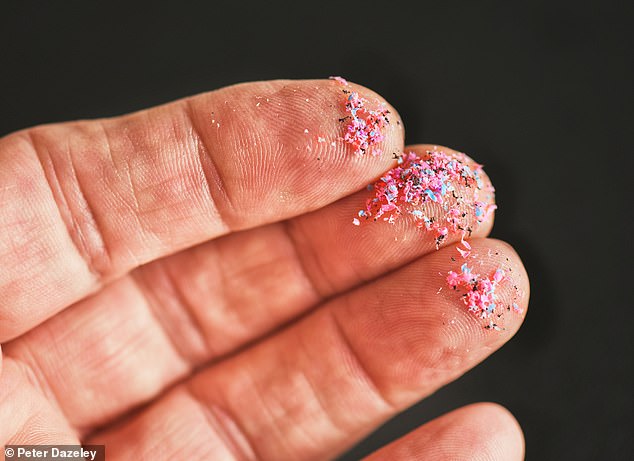- READ MORE: Tea bags release billions of dangerous microplastics into your body
With temperatures set to hit 32°C in parts of the UK this weekend, many Brits will be looking forward to cracking open a cold beer in the sunshine.
But a new study might make you think twice before reaching for your favourite bottle.
Scientists fom the French food safety agency, ANSES, have discovered that drinks sold in glass bottles - including water, beer, and wine - contain more microplastics than those in plastic bottles.
Initially, the researchers were baffled with this finding.
However, they soon worked out that the microplastic particles were getting into the drinks through the paint on the outside of the bottles.
'We expected the opposite result,' Iseline Chaib, who conducted the research, told AFP.
'We then noticed that in the glass, the particles emerging from the samples were the same shape, color and polymer composition—so therefore the same plastic—as the paint on the outside of the caps that seal the glass bottles.'
Worryingly, the long-term effects of these microplastics on human health remain unclear.


For the study, the team set out to evaluate the levels of microplastics in various popular drinks sold in France.
Their analysis revealed an average of around 100 microplastic particles per litre in glass bottles of soft drinks, lemonade, iced tea, and beer.
That was between five and 50 times higher than the rate detected in plastic bottles or metal cans.
The researchers inspected the glass bottles, and discovered small scratches on the caps, likely created due to friction between the caps when they were stored.
For water, both flat and sparkling, the amount of microplastic was relatively low in all cases, ranging from 4.5 particles per liter in glass bottles to 1.6 particles in plastic.
Wine drinkers will also be relieved to hear that wine contained few microplastics — even glass bottles with caps.
Soft drinks however contained around 30 microplastics per liter, while lemonade had 40 microplastics per liter.
Beer was the worst offender, with a whopping 60 microplastics per liter.

As it stands, the researchers do not know whether these microplastics represent a health risk.
However, researchers are increasingly concerned about the capacity of such particles to be internalised within cells causing alterations in cellular function, particularly when interacting with organs in children and causing definitive alterations in adult life.
There is a growing body of evidence that plastics could play a key role in early-onset cancer genesis, where healthy cells turn cancerous.
Last year, a study found cancer cells in the gut spread at an accelerated rate after contact with microplastics.
Experts have also raised the alarm about a potential between microplastics and reproductive health.
Scientists warned in June that they found tiny plastic particles in men's sperm.
Thankfully, the researchers say that drink manufacturers could easily reduce the amount of microplastics shed by bottle caps.
As part of the study, the team tested a cleaning method involving blowing the caps with air, then rinsing them with water and alcohol.
This was found to reduce microplastic contamination by 60 per cent.
Read more
Post a Comment for "Dangerous Microplastics Found in Beer Bottles: Scientists Issue Urgent Warning"